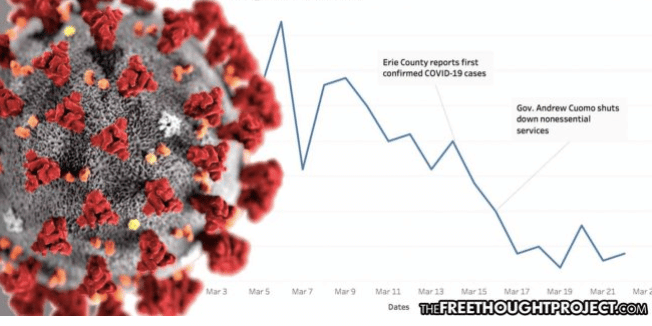As TFTP reported last week, prisons across the country are facing potential massive outbreaks inside their walls and are being forced to make the decision to release non-violent offenders to stave off catastrophe. Thousands of non-violent prisoners have been released and there has not been an uptick in criminal activity. What’s more, according to multiple reports, arrests are plummeting, and a department in Illinois has entirely shut down.
While the typical fearful citizen might read the above actions and lose their mind, thinking it is the end of the world and crime will run rampant, the reality is much different. Crime is in free fall. According to a recent report out of Buffalo, NY, the number of daily arrests before the pandemic typically exceeded 20 a day, including a recent high of 37 on March 6. Arrests since Thursday have ranged from two to eight a day.

The drop in arrests comes as people are told to stay home and businesses are closed. While the crime drop is attributed in part to the stoppage of commerce, police are also changing their roles during this crisis from kicking in doors to arrest people for a plant to patrolling the streets for safety.
What’s more, Buffalo Police department Captain Jeff Rinaldo pointed to the New York State bail reform that went into effect at the beginning of the year. As a result of the reform, police now issue appearance tickets for most minor crimes, resulting in them taking fewer people into custody.
“Because of bail reform and because we have so many people out of custody, they’re able to care for themselves, care for families, be nimble, flexible, respond to this pandemic,” said Kevin Stadelmaier, the chief attorney for Buffalo Legal Aid’s Criminal Defense Unit.
Imagine that!
By allowing people to remain free for committing entirely victimless crimes — instead of ruining their lives through incarceration — the government is able to stave off the potential for future crime, otherwise known as recidivism.
While Buffalo is reducing arrests, other cities, like Blue Island, Il., have disbanded their entire department. After an officer tested positive for COVID-19, Mayor Domingo Vargas made the decision to shut down the department. Naturally, the mayor is receiving backlash from other elected officials.
State Representative Bob Rita criticized Vargas’ action, saying, “At no point did the Mayor’s office contact my office, any member of the City Council or any other local leaders in making this rash decision.”
Despite the backlash, Blue Island has not seen an uptick in crime.
In New York City, crime has fallen as well. According to the NY Daily News, crime dropped 25% in the five boroughs during the coronavirus shutdown last week — with just one person murdered compared to eight the week before, authorities said Monday.
Each of the seven major crimes that determine the overall crime rate — murder, rape, robbery, felony assault, burglary, grand larceny and grand larceny auto — declined compared to the week before, according to NYPD statistics.
This drop in crime was expected given the fact that New Yorkers are on lockdown, but as TFTP has reported before, even when cops simply refused to do make arrests and write tickets when citizens were on the streets, the city did not descend into chaos.
In September, the NYPD threw a temper tantrum after Police Commissioner James O’Neill fired the killer cop who choked the life out of Eric Garner on video in 2014. The temper tantrum resulted in a plunge in arrests, but it did not lead to a spike in crime or violence — illustrating how most of the “policing” done in the US, is little more than revenue generation.
We saw a similar reaction in December 2014 when the NYPD threw their first temper tantrum over the reaction to Eric Garner’s death and simply stopped doing their jobs.
During the work stoppage, the city set a record for the lowest numbers of murders in the history of the NYPD.
As we reported at the time, the numbers were far more drastic than the current slowdown.
Citations for traffic violations fell by 94 percent, from 10,069 to 587, during that time frame.
Summonses for low-level offenses like public drinking and urination also plunged 94 percent — from 4,831 to 300.
Even parking violations are way down, dropping by 92 percent, from 14,699 to 1,241.
Drug arrests by cops assigned to the NYPD’s Organized Crime Control Bureau — which are part of the overall number — dropped by 84 percent, from 382 to 63.
The decline in crime coinciding with the decline in police activity essentially made the case that most policing carried out in the United States is done so for the purpose of revenue collection and not to fight crime.
Drug offenses, parking violations, and traffic citations are not so much crimes, as they are streams of revenue for the city. They are also the reason for the majority of police harassment within particular communities; harassment that is being proven entirely unnecessary as the COVID-19 crisis continues.
Imagine a police force that acted more like firefighters or EMTs. Firefighters don’t have to go door to door looking for fires, in order to be effective. EMTs, just like firefighters wait for a call before reacting and their services are oft proven invaluable contrary to that of police work. Perhaps this recent chaos can be used to channel this notion to the forefront and completely revamp the idea of policing in the land of the free.
Reprinted from The Free Thought Project.































